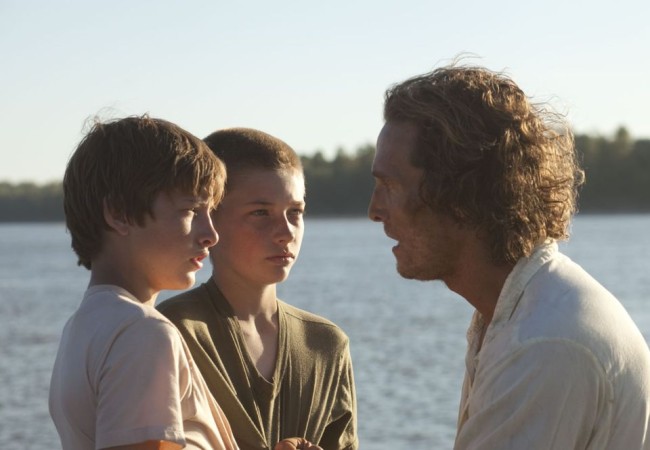Mud
dir. by Jeff Nichols
No boy can escape the charismatic allure of adventure, be it imagined or real. The pull’s too powerful. Ellis (Tye Sheridan) and Neckbone (Jacob Lofland) hear about a boat stuck up in the boughs of a tree on an island in the middle of the Mississippi River, and, with a madman’s insistence, sneak off at morning’s first light, and motor boat to the island for their first peak. Their ideas are big. They think the boat’s theirs, that they’ll be able to fix it and make it theirs. Neither of them ever stop to ponder how they’ll manage to get it down from the tree. They climb up into the boat’s hull and discover that someone else has been living there, evidenced by the stacks of nudie rags and empty cans of beans. The mess belongs to a convict on the run with a name like a tall tale: Mud.
Like an apparition, or fable, Mud (Matthew McConaughey) simply appears, without rhyme, without reason. Suddenly, and immaculately, he stands upon the island’s sandbar with a makeshift fishing pole, reeling in an empty hook. With snakes tattooed up along his forearms, a gun at his waist, and chipped, crooked teeth glinting like jagged rocks, Mud works counter to his appearance and washes the boys with a calm akin to the melodious lap of the river’s current. Like a good adventure, Mud intrigues the boys, but never intimidates them. Maybe it’s their still untouched hearts, their lack of heart break and abandon, their romantic notions, but the boys stand up to Mud and proclaim the boat theirs. They don’t care that he wears a gun, that he hides from the law. They care about the boat, the island, and girls. Ellis likes them for their beauty, their potential for romance, their purity; whereas Neckbone prefers to ogle girls, fawn over their bodies, think about how it would be to have sex with them. Ellis idolizes women, while Neckbone objectifies them.
What intrigues Ellis about Mud is the romance of his plight: he’s returned to Arkansas to reclaim his lady love Juniper (Reese Witherspoon) for a mad dash to the Gulf of Mexico—toward freedom and a life on the lam. It’s grand, it’s poetic. It’s everything a man should be. According to Ellis. It’s also everything his parents aren’t. They’ve ruined the illusion of love for him with their failed marriage, which is why Ellis latches on so tight to Mud’s mission of love. What he doesn’t realize is that Mud’s attachment to Juniper is infatuation, not love. Obsession even. It’s symbolic. It’s pedestal love. It’s the thing of childish embellishment. She was the girl responsible for saving him from a lethal snake bite when they were both Ellis’s age. She was the only one to show him any kind of love, this orphan of mud, this creature of the sticks, this child who stumbled out of the woods with neither name nor origin to his skin. It’s easy to see why Mud would become so infatuated with Juniper—or rather his image of Juniper.
Mud tells stories, describes people, the same way Huck Finn and Tom Sawyer discuss pirates and treasure in Twain’s classic boyhood novels. All of it’s magnified by awe and imagination—a salve to the unavoidable banality of life, to the wonton pain. To Mud, his sort-of foster father, Tom Blankenship (Sam Shepard), isn’t simply a former CIA operative, but a worldly assassin slick with a rifle. And his shirt is imbued with magical properties that keeps him invincible to any and all violence, especially snakebites. Mud sounds exactly like Huck Finn when the latter convinces Tom Sawyer that dead cats are the perfect cure for warts. Mud speaks in legends. And Ellis eats it up, like a kid starved for fantasy. Anything to blot out the realities of his private life: his parents’ impending divorce, the loss of his river boat home, the rejection of his high school crush. Ellis is so easily enchanted by the seductive legend that is Mud that he barely considers the flesh and blood beneath the lore. Mud’s guilty of fantasy, too. Ellis and Mud are so deeply entrenched in their fantastical self-constructs—their “adventure” to refurbish the sky-bound boat—that they fall blind to the very real adventure and violence swirling about them in the form of a Texas squad of goons out for Mud’s head. They’re barely keen to the very real problems unraveling around them—or rather, they’re barely aware that anyone else could possibly be the main hero of their story, too. For Ellis and Mud, everyone else is a side player to their central narrative. Ellis can’t possibly imagine that his parents’ separation has anything to do with their lives, their wants and ambitions, their urge for satisfaction; that May Pearl, his high school crush, could possibly want to date someone her own age in order to save face amongst her peers; that Mud would believe in a never-ending, all-consuming love to preserve an image of a person greater than the person that’s actually there. Whenever a situation plays against script Ellis can’t help but take it as a personal affront to his privately constructed narrative.
This is Jeff Nichols third feature as writer/director, and possibly his most sure-footed. The film flows with nary a hiccup, very much like the river it focuses upon. His greatest achievement here is his handling of Ellis and Neckbone. Coaxing performances out of actors this young is no small feat. Tye Sheridan’s performance is one of surprisingly adult-like control. He doesn’t fall prey to the ticks of many other young actors who have no clue how to occupy their screen time while playing out static, dialogue-laden scenes. He doesn’t flick his nose, toss his head to look off yonder, scratch his hair. He holds still, listens, and reacts. He gives and takes. Plenty child actors are more than able to take, but it’s the rare child that can give, too. The scenes between Sheridan and Lofland are natural—perhaps the most natural bits of the film—the way they gel despite their character’s opposing outlooks, how they share ideas like kids do: without challenge, without instant judgment., but with shrugged-off complacency. Ellis wants love to exist, and Neckbone just wants a gun, but they still spend most of their time together—selling fish, cruising on Neckbone’s motorcycle—because they share that same deep love for the river, and for boats that float in a sea of canopy. But then, as the script calls for it, it’s Sheridan who brings the thunder when Mud ostensibly forfeits the love he’s nursed for Juniper all these years. The tears break out like a dam unleashed, but not in a histrionic way, nor in a technical way that seems provoked or teased-out by eye droppers, the tears come from a place hidden down deep, a place that Sheridan is reluctant to share, as Ellis is reluctant to share. Ellis cries tears that he automatically regrets and wishes he could shove back in. They’re tears of anger, tears that sting with every drop, tears he’s ashamed to show. It’s that pull back, that regret, that demonstrates just how impressive an actor Sheridan is—a fact he initially brought to light in Terrence Malick’s The Tree of Life the year before. It’s tough enough to produce tears on command; it’s even tougher to do so and then hold them back as they come. It’s a deft actor that can pull off such seesaw balance.
The real winner here, of course, is Matthew McConaughey. As people have dubbed it: we’re in the midst of a McConaissance. McConaughey’s been on a winning streak ever since his cool-as-ice turn in the criminally underrated Lincoln Lawyer from a couple of years back. While Mud isn’t the actor’s biggest stretch since his rebirth—that honor falls to Dallas Buyer’s Club and HBO’s stellar True Detective series—it is the most indicative of the changes he’s made as an actor since his abominable rom-com days. McConaughey did good, solid work before he started up with his string of Failure to Launches and Ghosts of Girlfriends Pasts. Before that—and sometimes during his rom-com output—he had Dazed & Confused, Time to Kill, Frailty, etc. He was clearly capable of more. The problem was always his looks, his charisma, and that damn sexy drawl—all the essential requirements for joining pigeonhole central. The man was/is beautiful—an Adonis! Perfect eye candy for the women, and vicarious vessels for the guys who went to gobble up his rom-com drivel on Friday-night date nights. As most actors do, once bullied into a creative corner, McConaughey had little else to do but coast on his winsome personality. His charm hung from his neck like an albatross, sentencing him to a career of uninspired dross. It wasn’t till Magic Mike and The Paperboy—and to a greater extent Killer Joe—that McConaughey learned to use his charisma as a springboard into performances more developed than his pretty-boy fare. His new batch of characters are so fascinating because they allure and tease and promise something more. But you’re never 100-percent sure what that “more” is. In Killer Joe he teases violence, in Magic Mike it’s sex, and in Mud it’s adventure; it’s the promise of legend, of narrative transcendence. Mud is a child stuck in an adult’s body. He was never able to grow up past those childhood stories of heroes and villains, those snatches of river lore, of tall tales and urban legends, of CIA spies and evil mafia men. When Tom Blankenship arrives to the island to tell Mud off for his foolish errand to reunite with Juniper, McConaughey slumps his shoulders and occupies his fingers with a length of grass that he picks at and dismantles, like a spurned child unable to give up on those final sips of punch-drunk love. McConaughey plays Mud like someone awe-struck, forever puzzled and amazed by the brilliance of nature, the inexplicable, the adventurous, the brave. You’re sucked into the performance, but at the same time, you know Mud’s a person that only a child could trust. No rational adult would beleaguer themself to help this loony dude refurbish any kind of anything for escape, especially when you throw religious Texan thugs into the mix. And Texan thugs have their own wonky breed of justice: they don’t mind smacking a woman or child about to get what they want.
Now, the film isn’t without its detritus. The film’s bursting at the seams with characters—one too many—and there isn’t nearly enough time to acquaint us with them all. The most underwritten and wedged-in character belongs to Nichols-regular Michael Shannon who plays Neckbone’s womanizing uncle Glendale, a river-diving junk scrounger. It feels as if Nichols shoved Glendale into the film more out of loyalty to Shannon rather than doing it as service to the film’s thematic points. Although, it should be argued that Glendale still has one of the more symbolic moments in the film. There’s a pretty shot toward the end of the film, after Mud catches a bullet from one of the Texan thugs at Ellis’s riverboat home, where Glendale looks up from the bottom of the river and glimpses an ethereal Mud, spectral and tattered in his mystical white shirt, passing over him like a watery secret meant for his eyes only. Nichols proposes that, like the artifacts Glendale dredges up from their Mississippi abyss, Mud now belongs to the river—a waterlogged legend forever wrapped in lore. Like Paul Bunyan, like Blackbeard, Mud’s no longer a real human being. Mud passes over the Mississippi like the River Styx to a place just as full of mythology as death. He’s transcended life and transformed into folk tradition, a childhood reminisce. An adventure to be long remembered.







